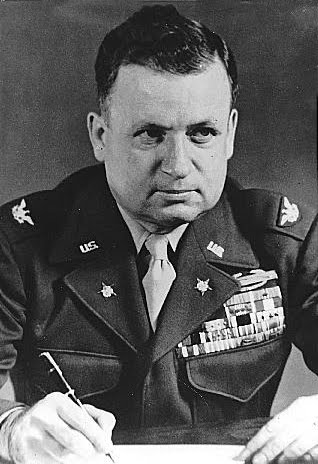Great Throughts Treasury
This site is dedicated to the memory of Dr. Alan William Smolowe who gave birth to the creation of this database.

S. L. A. Marshall, Samuel Lyman Atwood Marshall
American Soldier, Brigadier General and Chief U.S. Army Combat Historian, Author including Pork Chop Hill: The American Fighting Man in Action which was made into film of same name
"The art of leading, in operations large or small, is the art of dealing with humanity, of working diligently on behalf of men, of being sympathetic with them, but equally, of insisting that they make a square facing toward their own problems."
"Fundamentally only two great novelties have come out of recent warfare. They are: (1) mechanical vehicles, which relieve the Soldier of equipment hitherto carried by him; (2) air supply, which relieves the vehicle of the road."
"In an attack half of the men on the firing line are in terror and the other half are unnerved."
"On the field of fire it is the touch of human nature which gives men courage and enables them to make proper use of their weapons. One file, patting another on the back, may turn a mouse into a lion; an unexpected GI can of chocolate, brought forward in a decisive moment, may rally a stricken battalion. By the same token, it is the loss of this touch which freezes men and impairs all action. Deprive it of this vitalizing spark and no man would go forward against the enemy."
"Simply underscores the fact that primarily war is made with fire, and that logistics have a decisive effect upon the arena only when they enable military forces to bring a superior fire to bear."
"A revealing light is thrown upon this subject (low soldier firing rates) through studies by Medical Corps psychiatrists of the combat fatigue cases in the European Theater. They found that fear of killing, rather than fear of being killed, was the most common cause of battle failure in the individual, and that fear of failure ran a strong second."
"Studies by Medical Corps psychiatrists of combat fatigue cases... found that fear of killing, rather than fear of being killed, was the most common cause of battle failure, and that fear of failure ran a strong second."
"The bayonet is not a chemical agent the mere possession of it will not make men one whit more intrepid than they are by nature. Nor will any amount of bayonet training have such an effect. All that may be said of such training is that, like the old Butts Manual, its values derive only from the physical exercise. It conditions the mind only in the degree that it hardens the muscles and improves health. The bayonet needs now to be re-evaluated by our Army solely on what it represents as an instrument for killing and protection. That should be done in accordance with the record, and without the slightest sentiment So considered, the bayonet will be as difficult to justify as the type of slingshot with which David slew Goliath."
"The Japanese were masters at using classical conditioning with their soldiers. Early in World War II, Chinese prisoners were placed in a ditch on their knees with their hands bound behind them. And one by one, a select few Japanese soldiers would go into the ditch and bayonet "their" prisoner to death. This is a horrific way to kill another human being. Up on the bank, countless other young soldiers would cheer them on in their violence. Comparatively few soldiers actually killed in these situations, but by making the others watch and cheer, the Japanese were able to use these kinds of atrocities to classically condition a very large audience to associate pleasure with human death and suffering. Immediately afterwards, the soldiers who had been spectators were treated to sake, the best meal they had had in months, and to so-called comfort girls. The result? They learned to associate committing violent acts with pleasure."
"Throughout human history, when humans fight each other, there is a lot of posturing. Adversaries make loud noises and puff themselves up, trying to daunt the enemy. There is a lot of fleeing and submission. Ancient battles were nothing more than great shoving matches. It was not until one side turned and ran that most of the killing happened, and most of that was stabbing people in the back. All of the ancient military historians report that the vast majority of killing happened in pursuit when one side was fleeing."
"We are trapped in this spiral of self-dependence and lack of trust. Real progress will never be made until we reduce this level of fear. As a historian, I tell you it will take decades--maybe even a century--before we wean Americans off their guns. And until we reduce the level of fear and of violent crime, Americans would sooner die than give up their guns"
"It is on supply that war is made."